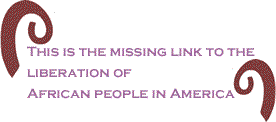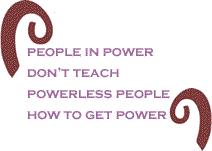
|
||||||||||||||||||||||
|
||||
 |
||||
Ideas
are weapons of war and that is why the white supremacy system in
There
are far too many African people in this country who think what is
good for other people should be good for us. Nothing could be further
from the truth. We can only determine what is good for us by reestablishing
Black Nationalist thinking and developing a Black Nationalist program
of action. This is the missing link to the liberation of African
people in Black
Nationalism is a tradition that emerged in the early nineteenth-century
among those Black leaders who understood the need for African people
in These
nineteenth-century Black Nationalist leaders such as Denmark Vessey During
this era there were some Black Nationalist leaders before Other
Black Nationalist leaders led movements for Black people to control
the towns where they lived and others who led movements to the western
region of this country to establish all Black towns in The
core of this Black Nationalist tradition has been to defeat and
overthrow the system of white supremacy The
Black Nationalist tradition has always been opposed to integrations Black
Nationalists have been historically clear that people in power don�t
teach powerless people how to get power. And they certainly don�t
give power away As
Black Nationalism emerged in the twentieth-century Garvey
used his varied skills to become on of our true twentieth-century
freedom fighters. Garvey arrived in
This
was reflected in the First International Convention of the Negro
Peoples of the World In
this context The Black Nationalist tradition was continued in the twentieth-century through the Nation of Islam and the Honorable Elijah Muhammad who utilized many of the Garvey and UNIA/ACL organizing tactics and strategies. It
was during the 1960s Black Power explosion that the Black Nationalist
tradition reemerged through the influence of Malcolm X who adopted
Black Nationalism as the political philosophy Finally Without
vigorous Black Nationalist thinking and an aggressive Black Nationalist
program of action Once
Black Nationalism is understood by all Black people BlackCommentator.com Columnist, Conrad W. Worrill, PhD, is the National Chairman Emeritus of the National Black United Front (NBUF). Click here to contact Dr. Worrill. |
||||
 |
||||
If you would like to comment on this article, please do so below. There is a 400 character limit. You do not need a FaceBook account. Your comment will be posted here on BC instantly. Thanks. Entering your email address is not mandatory. You may also choose to enter only your first name and your location.
|
||||
Thank you very much for your readership. |
||||
| Any BlackCommentator.com article may be re-printed so long as it is re-printed in its entirety and full credit given to the author and www.BlackCommentator.com. If the re-print is on the Internet we additionally request a link back to the original piece on our Website. | ||||
| |
||||
Issue 361 |
| Executive Editor: Bill Fletcher, Jr. |
| Managing Editor: Nancy Littlefield |
| Publisher: Peter Gamble |
| Est. April 5, 2002 |
| Printer Friendly Version in resizeable plain text format |
 |
 |
 |

|
 |
| |
| |


































 Perhaps
Garvey�s greatest contribution to the upliftment of our people
Perhaps
Garvey�s greatest contribution to the upliftment of our people









